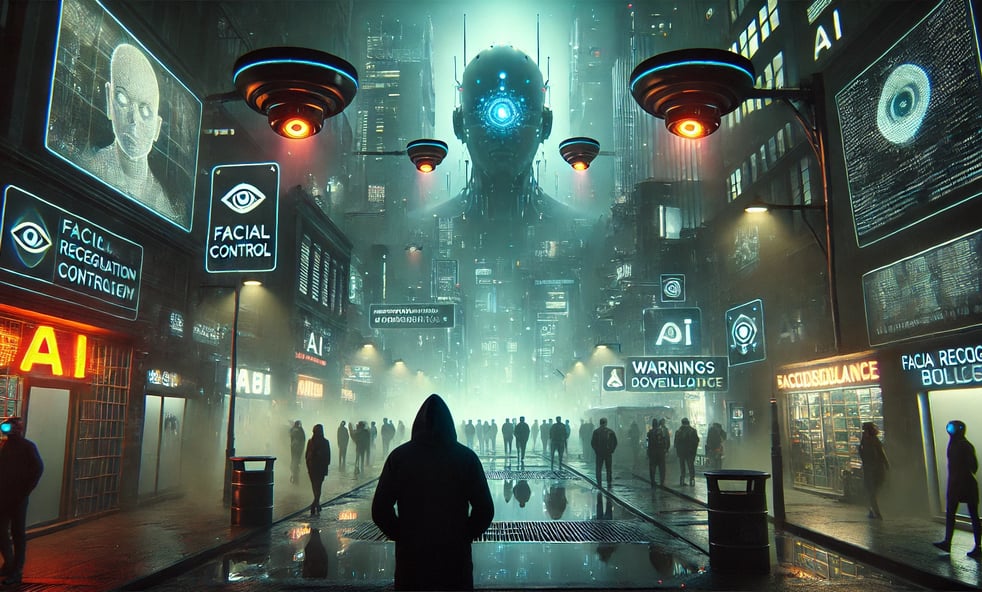The Dark Side of Progress: How AI is Shaping Our Dystopian Present
Explore how artificial intelligence is creating real-world dystopian scenarios, from surveillance capitalism to job displacement and the erosion of human agency. Learn about the concerning parallels between science fiction warnings and our current reality.
AIDYSTOPIAECONOMIC DECLINEALGORITHMIC CONTROL
Margot Lanihin
1/27/20253 min read


Introduction
The science fiction warnings of yesterday have become today's headlines. As artificial intelligence systems become increasingly sophisticated and ubiquitous, we're witnessing the emergence of a subtle yet pervasive technological dystopia that threatens to fundamentally reshape human society and experience.
The Invisible Cage of Algorithmic Control
Every click, every purchase, every moment spent online feeds the massive AI systems that increasingly shape our reality. These algorithms don't just predict our behavior – they actively modify it through carefully crafted recommendations and targeted content. The result is a digital cage of our own making, where our choices feel free but are invisibly guided by artificial intelligence designed to maximize engagement and consumption.
Social media algorithms create echo chambers that polarize communities and erode democratic discourse. News feeds are curated not for truth or importance, but for emotional impact and click-through rates. Our digital lives have become an endless feedback loop where AI systems study our behavior to better influence our future actions.
The Erosion of Human Agency
Perhaps most concerning is how AI is gradually replacing human decision-making across crucial domains. From determining who gets a loan to who gets hired, artificial intelligence increasingly makes life-altering decisions using opaque criteria. This shift represents a fundamental transfer of power from human judgment to algorithmic determination.
In healthcare, AI systems are beginning to diagnose patients and recommend treatments. In education, they're personalizing learning paths and assessing student performance. While these applications promise efficiency and accuracy, they also reduce human agency and create concerning dependencies on black-box systems we cannot fully understand or question.
The Workforce Wasteland
The impact of AI on employment extends far beyond simple automation. We're witnessing the emergence of a new economic reality where human labor is increasingly marginalized. White-collar professionals once thought immune to automation now face AI systems capable of performing complex analytical and creative tasks.
This isn't just about job displacement – it's about the fundamental restructuring of human purpose and worth in an AI-driven economy. As artificial intelligence becomes more capable, we must grapple with difficult questions about the role of human work and meaning in a world where machines can perform most tasks more efficiently.
Surveillance Capitalism and the End of Privacy
The dystopian present is perhaps most evident in the rise of surveillance capitalism, where our personal data is continuously harvested and analyzed by AI systems to predict and influence our behavior. Smart devices monitor our homes, facial recognition tracks our movements, and predictive algorithms anticipate our needs before we're conscious of them.
This unprecedented surveillance infrastructure, powered by artificial intelligence, creates a world where privacy becomes an illusion and personal autonomy is subtly but persistently undermined. The system knows our preferences, habits, and vulnerabilities better than we do – and uses this knowledge to shape our choices and behaviors.
The Death of Authenticity
AI-generated content is flooding the digital landscape, making it increasingly difficult to distinguish real from artificial. Deep fakes, synthetic media, and AI-written content blur the lines between authentic human expression and machine-generated mimicry. This erosion of authenticity threatens not just our media ecosystem but our fundamental ability to trust our own perceptions.
The proliferation of AI chatbots and virtual influencers creates artificial relationships that can feel more engaging than human ones, leading to a world where genuine human connection becomes increasingly rare and valuable.
The Path Forward
This technological dystopia wasn't created by malicious intent but by the cumulative effect of pursuing efficiency, convenience, and profit without sufficient consideration of the human consequences. The challenge now is not to abandon artificial intelligence but to reshape its development and deployment to serve genuine human flourishing.
We need stronger regulations around AI development and deployment, greater transparency in algorithmic decision-making, and a renewed focus on preserving human agency and authenticity in an increasingly artificial world. Most importantly, we need a broad public discourse about what kind of future we want to create and how technology can serve rather than subvert human values and interests.
The dystopia is not inevitable, but avoiding it requires conscious effort and collective action. We must recognize the subtle ways AI is reshaping our world and take steps to ensure that technological progress enhances rather than diminishes human flourishing. The future remains unwritten, but the time to shape it is now.
